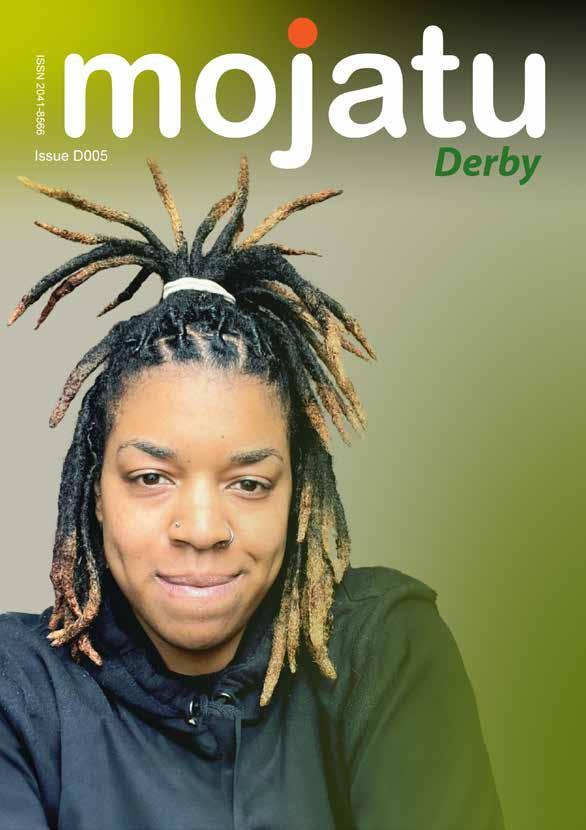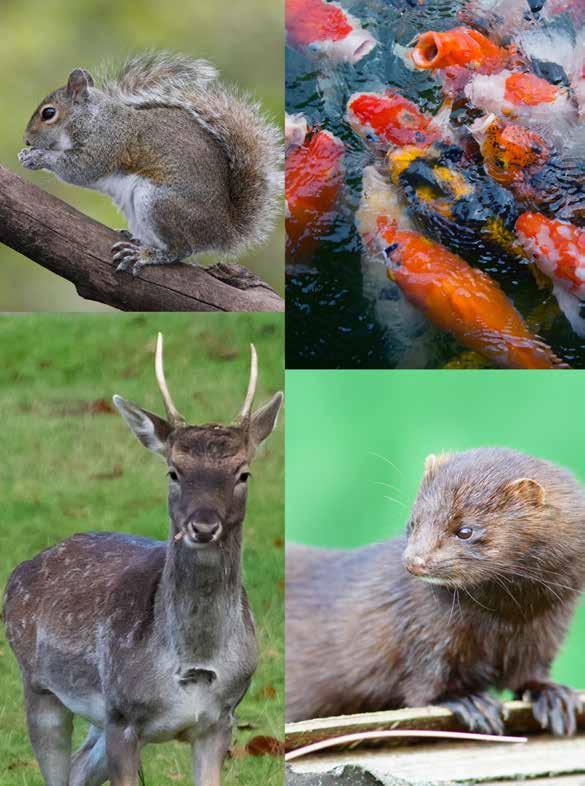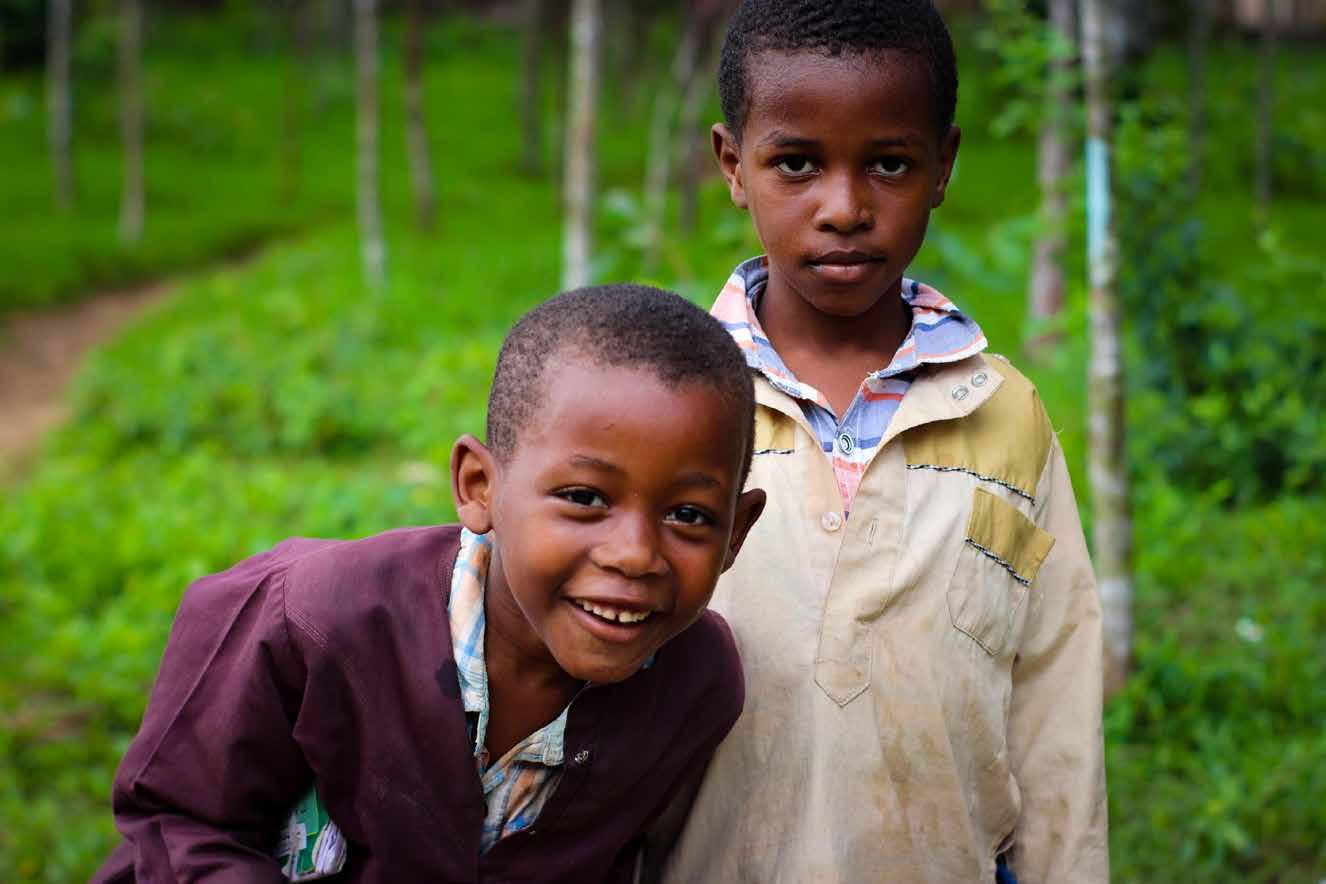


WINDRUSH GENERATION 75th Anniversary SAM CARNIVAL Costume Designer BEV STEWART Open Doors Forum Cover story: Uni student shakes off labels - Page 30




Summertime is upon us, bringing with it (hopefully) great weather and some of the year’s most highlyanticipated events. Among the most culturally significant of these is National Windrush Day, made all the more important by the fact that 2023 marks a whole 75 years since the original members of the Windrush Generation came from the Caribbean to the UK.
A recurring sentiment you’ll find across this issue of the magazine is that this landmark anniversary is not just a cause for celebration, but a vital opportunity to recognise and preserve the legacy of those original pioneers while they’re still with us.
In Derby – home to many Caribbean families with Windrush roots – some of this work has already begun. On pages 10-11, you can find out about the role that the Open Doors Forum plays in supporting our city’s Caribbean elders and youth. Meanwhile, pages 12-13 serve as an introduction to the ambitious Small Island Stories 2 project, which is telling Windrush tales through music, film and theatre.
Less than a month after Windrush Day, Derby’s Caribbean population will take to the streets to honour their ancestors at the city’s annual Carnival – and everyone is invited. On pages 14-15, costume designer Samantha Hudson takes us behind the scenes of the most vibrant event of the summer, and on page 16, Donna BriscoeGreene explains why none of it would be possible without the experience of the Windrush Generation.
Suffice to say, Derby would not be what it is today without the Generation and their descendants, and we at Mojatu are proud and grateful for their contribution to our city.
Jamie Morris Assistant Group Editor

Editorial
Group Editor: Peter Makossah - peter.m@mojatu.com
Managing Editor: Jamie Morris - derby@mojatu.com
Design: Robert Borbely - robert@mojatu.com
Photos: www.freepik.com
Contributors: Jamie Morris | Tristan Best
Sarah-Louise Elton | Jack Dixon | Billy Darlington Penny
Cooper | Saida Egeh
IT: Julius Mwangi - julius@mojatu.com
Accounts: Thierry Karume - accounts@mojatu.com
Admin: Penny Cooper - penny@mojatu.com
Sales & Marketing | Community Engagement:
Abdoulie Jah - jah@mojatu.com
Edwin Ubah - eddy@mojatu.com
The views expressed in this magazine are not necessarily those of the publishers. Every effort has been made to ensure that the contents of this magazine are accurate but the publisher cannot take responsibility for errors, omissions, nor can we accept responsibility for the advertisements or editorial contributions.
News & Comments: news@mojatu.com
Social Media: Jamie Morris - derby@mojatu.com
Audio Contents:
Seif-el-deen Abushkhaidem - seif@kutambua.com
Getting the magazine:
Online @ www.mojatu.com|magazines
Subscription @ £24 per year including postage
Address: 91 Melbourne Street, Derby, DE1 2GF.
T: 0115 8457 009 | 07393499448 | 0751 366 1176
Facebook: facebook.com/MojatuDerby
Twitter: twitter.com/MojatuDerby
Instagram: instagram.com/mojatuderby
Printers: Mojatu Media
Contents
Editor ’s Welcome
Cover
Mojatu Media Disclaimer
Sophie Nelson
News & Sports Derby County 2023 recap 4 Running a marathon ...................................................5 Community The Windrush Generation .........................................9 Open Doors Forum ............................................. 10-11 Arts & Culture Small Island Stories 12-23 Sam Carnival ......................................................... 14-15 Donna Briscoe-Greene ............................................ 16 Is grime really dead?................................................. 17 Health & Food Weight loss and gain ................................................ 20 Self-esteem tips for men 21 ADHD and college..................................................... 22 Sustainable cars ......................................................... 25 More takeaways to try ............................................. 26 Business & Finance Minority-owned businesses...................................... 27 Scams to avoid 28 Education & Career Sophie Nelson................................................................. 30
DERBY COUNTY: HOW LEAGUE ONE HAS GONE SO FAR IN 2023
 By Tristan Best
By Tristan Best

With the end of the season here, let’s have a look back at what the Rams have been up to…
At the beginning of the season, I had written a few stories, including praise and criticism after the unfortunate demotion that the club had been put through. The club had been penalised due to the poor management and breach of rules since the former owner had joined the club.
With that being said, since the entity had left, the club began to work right – more effectively and efficiently to keep it brief.
David McGoldrick would have to be my outfielder of the year, as he managed to score the majority of the club’s goals from the start to the end of the season. With a noble 22 goals and 5 assists, McGoldrick set himself above his teammates.
He will be pivotal going forward – especially next season as the Rams give it another go on their mission to reach the Championship again.
During the middle of the season, I would have likely thought Thomas Barkhuizen or Louis Sibley would’ve produced more, due to the flair they possess when they have the ball in their possession. Tom Barkhuizen managed to only contribute 9 times in total over the League One campaign: 4 goals and 5 assists.
Louis Sibley, my favourite player for the club, only
managed to contribute 4 times. With 26 starts and 42 matches played in total, I’d expect a much better return from the left-footed ace. Perhaps next season, he’ll see a better vein of confidence and luck.
A few special notices go out to Conor Hourihane, with his massive contributions this season of 7 goals and 10 assists, Mendez-Laing with his intensity and contribution of 7 goals and 8 assists, and last but definitely not least, Eiran Cashin, who himself managed to clock in the most minutes for an outfielder in the club with 3,842 minutes.
Only the keeper, Joe Wildsmith managed to accumulate more minutes under this season’s management.
My overall judgement on the season would be positive, as finishing seventh isn’t too bad. Generally speaking, losing players and structure in the team would normally push you further down the table. But with the general grit and grind of the team, that was not the case this time around.
Next season, with some smart spending, and smart work on the training pitches, I definitely see this team achieving a promotion and returning to the Championship table.
It will require much more hard work, much more teamwork and definitely much more organisation though. But it is possible, most definitely.
4 mojatu.com News & Sports
THE ROAD TO RUNNING A MARATHON PART ONE
 By Tristan Best
By Tristan Best
Community journalist Tristan Best takes us through his personal journey of selfimprovement…

Growing up, I always admired the athletes, the Olympians, the boxers and especially the footballers. Even though the latter had been noted as the weaker sportsmen than the rest, I just couldn’t deny the sheer greatness of the lifestyles they had to endure. Pure fitness and mega ability is compulsory to be considered one of ‘the greats’ in the game.
Cristiano Ronaldo always inspired me. He’s had the world on the edge of their seats for the last 15+ years – always intensely in shape, ready to win, ready to prove the doubters wrong. I love that: the raw need to succeed.
In school, I always participated in cross-country events, from Year 7 right up until Year 11. The event typically got bigger with age, with the last event being over 7 km. I played football three times a week minimum back then, contributing to keeping myself active and fit. I used to go road-running with an old school friend, too, when we felt the urge, which would usually span between three to five miles.
Between the ages of 16 and 20, however, I found myself stuck in a massive void of emptiness as I developed a nasty habit: laziness. It had a hold on my relationships and life as a whole. I called that part of my life the ‘depression stage’, as I thought I had no hope and I had actually lost my confidence. Little did I know, all I had to do was motivate myself, which can be a great mountain to climb sometimes.
That being said, it was in my mind where the biggest battles were fought. I got myself back in the gym on January 10th, 2023 – a big date for me, as that marked the start of a new beginning for myself. That
session I had with my good friend Kaylan boosted my confidence and sparked a love for fitness again. We actually kept quite a strict routine of only two rest days a week for roughly two months.
We both could see the huge developments made at the very start of the journey. With myself being 5’8” and looking to bulk up and Kaylan being 6’2” and looking to tone down, I felt like we had done a great job. At that stage of the climb, we managed to cover 5 km in 25 minutes, which was a great feeling. It was only the start of my fitness journey.
And then illness came like a sorrowsome cloud and hung to stay for a while. Everybody knows you’re not at your best when you’re unwell. I had lost out on a month’s worth of training, and just being away from the steam room – which was broken at my local gym for a while – had done me damage due to my growing dependency on it for help with my asthma.
With all of this in place I felt so low. I just could not believe the downfall I had, but with my luck and resilience, I eventually got myself back into gear, and we both ended up back on the grind and back to our schedules. I nailed plenty of gym hours, before stepping foot on the road for a run. Kay, on the other hand, had kept at it, constantly improving as he went for his routine runs, while also still hitting the gym quite regularly.
On the third week of being back, following a couple of runs on the treadmill, we found ourselves deep in a 7.5 km run, and what a feeling that was. We hadn’t had the intention of going that far, but we certainly did. That following morning I woke up with an itch to go again, but I stopped myself because rest is key.
5 Derby connected News & Sports
Read the next instalment of Tristan’s journey in our Autumn issue, or follow along online at mojatu.com
FOUR ANIMALS YOU MIGHT NOT KNOW ARE ACTUALLY INVASIVE SPECIES -
By Tristan Best
We take a look at non-native species and the damage they can cause to the environments they reach…

King Carp
Common, Mirror and Koi are all Carp species, with the word Koi meaning carp in Japanese. The species of fish was brought to the UK in the 12th century by monks. They were originally kept for food, but plenty soon found their way into the wild, and due to the popularity of the fish and the particular style that is used to catch them, the British people eventually began to stock them in their waters all over the UK.
Unfortunately though, the main issue with those particular species is that they are able to hybridise with the native Crucian Carp, which is unfortunately endangered at the time of writing. In other parts of the world, the King Carp is known to be a pest species. In places such as the USA, the fish are removed from the waterways if caught. It is noted though, that they are in a mass abundance across the pond, so it is seen as a justifiable action to be undertaken.
Deer
The Muntjac deer is an invasive species causing damage in the southern side of England. They were initially brought back as pets in 1883 from places such as Taiwan and south-eastern China, by the Duke of Bedford. They appear as small dog-sized deer with antlers like teeth – or fangs, for a better description.
After escaping from the place that they were kept during World War II, the Muntjac were able to thrive and continue to repopulate all year round, causing them to multiply over the years to come. They’ve been known to spread to the East Midlands, Warwickshire, the south and even Wales. This is due to the fact that they are efficient all year round, but they can seriously damage our crops, natural
flowers

Grey Squirrel
The beautiful Eurasian Red Squirrel is critically endangered in the UK. This is due to the introduction of the North American Grey Squirrel back in 1870 – since that date, the population of the Red has declined from roughly 3.5 million to a staggering estimate of only 120,000-160,000. In England, the numbers are estimated to be around a meager 15,000 Red Squirrels.
The Eurasian Red Squirrel is highly threatened due to the infectious diseases brought over by the Grey species. This disease doesn’t affect the Grey, but it decimates the Red species. On top of this, the Red species is a fragile animal – when disturbed, they won’t be able to reproduce as often, which really harms the likelihood of keeping them amongst our wildlife networks and environments.
American Mink
The semi-aquatic carnivore spread throughout the UK following escapes from fur farms in the 1930s. This little creature causes havoc all over the UK, from the south of England to Scotland. In Ilkeston, it’s known that in the last couple of years, the swan population has had a massive struggle due to the dexterity of the mink. In recent years the swan population has seen a decrease in the area, with the high activity of the mink. The young swans are not able to thrive as they should if the mink were not present.
They affect all kinds of animals from salmonid populus in the rivers, to waterfowl and nesting seabirds. They eat eggs and baby birds constantly as they look to feast. The mink also affects economic attractions, such as fishing, crofting, game shooting, fish farming and tourism.
6 mojatu.com Community
and tree populus.
Derby connected Community

7
King Carp
American Mink
Grey Squirrel
Deer
This programme is split into two sections:
1. Participants undertake Accredited Music Production training course to fully develop their technical skills and will also be coached by experienced industry professionals to help them fully embrace their creative side.

2. The final product will be a powerful sound collage that participants will take away with them with the possibility to showcase their work at a series of venues, events and on the radio.
Fearless Youth Collective


Fya Notts
fya_notts
FYA_Notts
0115
An exploration of thoughts, feelings and energy through the creative power of written prose and rhythmic beats.
Writing & Recording Songs
Spoken Word Poetry Production
fyaonline.com



info@fyaonline.com
Unit 8, Howitt Wing Building, Lenton Blvd NG7 2BY

.com 8
784 6666 / 07940801393
WHO ARE THE WINDRUSH GENERATION?
 By Tristan Best
By Tristan Best

2023 marks 75 years since the first arrival of the Windrush Generation.
The whole topic and the people get their name from the boat called the HMT Empire Windrush. It was originally called MV Monte Rosa, and a passenger liner and cruise ship launched in 1930 in Germany and owned by the shipping line Hamburg Sud. The first journey from the Caribbean was said to have successfully carried over 1,027 men, women and children, looking to start a new life.
The massive vessel arrived in Tilbury Docks, East London on 22nd June, 1948. This marked the beginning of the Windrush Generation, as it was the first of many ships to come and go with new people and new beginnings. Due to the large number of people migrating to Britain, the British government enforced the 1948 British Nationality act, which gave
everyone who lived in the UK or any British colony around the world the exact same rights to live and work in Britain. This helped a lot of people make the leap for a fresh start.
Back in those days, the voyage by boat was a mighty journey, usually taking 21-22 days from Jamaica to the UK. Between 1947 and 1970, almost half a million people took the journey from the Caribbean to Britain by boat and plane.
It’s very important that we remember what the Windrush generation did for us, when they came here all those years ago. The many people who started a fresh life helped to rebuild Britain. They worked in many different occupations and without them the Country would have been in drastic turmoil.


The many men and women working everyday ensured that we had an efficient railway system, construction business and health system, with the doctors, nurses and practitioners and much more taking care of us when they were needed. Not to forget this was in aid after the Second World War, so we really needed help.
This year, 2023 marks the great 75th anniversary of the Windrush Generation’s first voyage, so you can expect great festivities all over the United Kingdom. Embrace the culture they have brought to the UK and remember to treat people with the same respect that you would expect them to treat you. Equality is the key to a happy and efficient society.
Artwork by Amal Hudson (colour) and Samantha Hudson (monochrome)
9 Derby connected Community
We speak to Open Doors Forum co-founder Bev Stewart about how the charity has been supporting young and old alike since 2003…
Derby is a city filled with great opportunities – but people’s access to them isn’t always equal, with many facing unfair disadvantages as a result of their race or class. The task of bridging these gaps often falls to those in the voluntary sector, who give up their own time and energy for the betterment of their communities.
Among these grassroots heroes is the hardworking team behind the Open Doors Forum: a voluntary organisation aimed at improving the lives of all generations of Afro-Caribbean people in Derby.

“Too often, people are not connected,” says Bev Stewart, who established the organisation alongside co-founder Sonia Richards in May 2003. “So we decided to try and join up the dots.”
Among ODF’s main recurring projects is its threeweek summer scheme, which facilitates sports, education and free food for children during the school holidays. Past activities have included baking, first aid practice and paintballing, with large cohorts of children taking part in the fun year after year.
“I can say in all honesty that we’ve had over a thousand children go through our organisation,” Bev says. “In fact, many of the kids that used to come here for the summer scheme are now bringing their own children here.”
In addition, ODF works with institutions such as the City Council to boost educational and employment outcomes for young Black people throughout the city, and on one occasion even made contact with the fire service to successfully help one of their
CHARITY CELEBRATES 20 YEARS OF OPENING DOORS FOR DISADVANTAGED COMMUNITIES
By Jamie Morris
young service users start a career as a firewoman.
Honouring the past by caring for their elders is just as important to the ODF crew as supporting the youth, however, and much of their work is based around highlighting the under-discussed health issues that can tragically cut Black people’s lives short.
“We try to raise awareness of issues like organ donations, sickle cell and prostate cancer – things that affect us directly as Afro-Caribbean,” Bev says. “The hardest thing I do is attend a lot of funerals, because it’s part of our community to show honour to people who have passed and to give support to the family.”
On the last Wednesday of each month, ODF also invites the elderly to socialise over tea, coffee and cake at their base at the ANFC Church in Normanton, which doubles as a warm space for people struggling to pay for heating. Furthermore, ODF will be commemorating the 75th annual Windrush Day with a series of events aimed at members of the Windrush Generation this summer, including a day at the Royal Ascot races on 22nd June and a dinner dance at a later date.

Twenty years in, ODF shows no signs of slowing down – but Bev says that there’s always a need for further volunteers in order for the organisation to keep running. “People don’t always give back, so my advice for everybody is to give a minimum of two hours a week – or even two hours a month – just to help grow your community. I don’t think it’s a lot,” she says.
“We want to say thank you to all the supporters and all the people that have volunteered for us over the years, because without them, we couldn’t function.” Find
mojatu.com 10 Community
out more at opendoorsforum.org

11 Community Derby connected
WINDRUSH STORIES AMPLIFIED THROUGH EXTENSIVE MULTIMEDIA PROJECT
 By Jamie Morris
By Jamie Morris
We sit down with the creatives behind Small Island Stories 2 to find out how they’re honouring their heritage via music, film and theatre…
2023 marks 75 years since the initial arrival of the Windrush Generation from the Caribbean to the UK, and many have suggested that this could be the final major anniversary that most of the original pioneers will live to see. As a result, the need to record and pass on their stories is arguably now more pertinent than ever –but how can these tales be presented in a way that will reach the younger generations that need to hear them?
Small Island Stories 2 – a multimedia project spearheaded by arts organisations Motion Framework and Mashup Derby – proposes not one, but several solutions to this question. Starting off as the second of two hip-hop albums paying homage to Windrush history, the project has since snowballed into an accompanying short film, exhibition and live show.
The pair of albums began life as the brainchild of teacher, rapper and Motion Framework founder James Batchelor. “Hip-hop is usually braggadocious guys talking about how big they are in drug games or how established they are in their street culture – but I don’t fit those moulds, because I’m a school teacher,” says James. “What do I have that signifies that I am me? My heritage.”
As the son of Jamaican parents, James sought to weave his roots into his music by featuring samples of conversations with his family alongside lyricism about his own experiences. “Old school Caribbean people tell the greatest stories,” he says. “So let’s amplify them.”
After a strong response to the first album and a funding package from Derby CAN, James and his partner Tandeka Williams – who was born in Guyana – set about creating a sequel to Small Island Stories that would compile tales from the wider Caribbean community. “As much as the Windrush has its stories, there are other stories,” Tandeka explains. “And it wasn’t just Jamaican families that came on the Windrush, so we wanted to highlight that by including other small islands and all of the people of the Commonwealth that came and contributed.”

Tandeka’s experience in youth work as part of Mashup Derby also allowed for the project to become more collaborative, as she worked with young artists to bring out their talents and help illustrate the stories in a variety of formats. A short film serving as a visualiser for
the album was produced and shown at Quad and Déda, and will be screened as part of the UK-wide Windrush Caribbean Film Festival throughout June.
“We brought in young people from the community and showcased their work in the film, which then rolled onto us talking about images of Black people,” Tandeka says. “How many people recognise certain Black people? When you Google ‘Black people’, what images do you see? Are they positive or negative?”
This idea was depicted via an eclectic collection of portraits of Black people throughout history, printed in monochrome and removed from their context in order to test visitors’ knowledge, prompt questions and start discussions. The gallery is set to tour the UK, with more photos to be included.
Small Island Stories 2 has also grown to encompass a live performance element, which extends from Mashup Derby’s background in impromptu theatre. “It’s about mashing up your skills and our skills, no matter what they are,” James explains. “If you can dance, you can sing or you can stand on one leg for one minute…put all that in a theatre show and you’ve got Mashup Theatre.”
Tandeka says this discovery of hidden talents is what Mashup and Motion Framework are all about. “You might look at your skills and think, ‘That’s not a skill, that’s just something that I can do’,” she adds. “But that’s exactly what a skill is.”
James and Tandeka hope that projects like Small Island Stories 2 will not only connect Derby’s Black youth with their past, but also help to shape their futures by showing that a career in the arts can be more than just a pipe dream. “You don’t have to be academic – this creativity thing could be your buzz,” James says. “Can you imagine a world with no art or entertainment? The world needs creatives.”
Follow @motionframework and @mashupderby on Instagram for more
mojatu.com 12 Arts & Culture

13 Arts & Culture Derby connected
“THEY’RE NOT JUST COSTUMES – IT’S FOLKLORE,” SAYS LEADING CARNIVAL DESIGNER
By Jamie Morris
We caught up with Samantha Hudson – aka Sam Carnival – to talk about the costume design process and her new research project…
Mojatu: How did you first get involved in Carnival?
Sam: I was born into Carnival. My earliest memories of it were in the 1980s on a float with bunting, balloons, my friends and my parents on Normanton Park. Culture was always a part of our upbringing, so I just carried on being involved in it.
Mojatu: Do you have a favourite Carnival memory?


Sam: My favourite Carnival memory isn’t actually from the day of the Carnival. I had a knock at the door one evening, and it was a young person who had come to see one of my twins, so I said he could come in until they got back. I was making a massive phoenix costume, and I asked if he could give me a hand – anybody who comes into my house has to help out. He was helping to attach the sequins and he said, “Sam, this is really therapeutic!”
I told him about Carnival and asked if he was
coming…and he said no. He was born in Iran, and he told me that when he was ten, he witnessed public executions that traumatised him, and because of that he doesn’t like big crowds. He’d never go to a Carnival, but he’s happy to help out behind the scenes. Carnival is a big jigsaw. Everybody has their part to play and everything is important, so if one piece is missing, then it’s not the full picture. Even though he wasn’t there on that day, his contribution meant a lot.
Mojatu: Where do you find inspiration for costume ideas?
Sam: We get the young people together and talk about what kind of themes they’re interested in, and look at what’s happening politically and socially. We had two themes last year. The under18s section was celebrating sixty years of the Derby West Indian Community Association. We had bright, canary yellow feathers representing the Caribbean sun, tangerine orange representing the tropical fruits, and turquoise representing the ocean.
It was also the Queen’s Platinum Jubilee, so we had a section which was purple, because it’s a regal
mojatu.com Arts & Culture 14
colour and used to only be worn by aristocrats. Everybody is regal and important to us, so we did a section for over-18s that was all purple. It all means something. They’re not just costumes – it’s folklore, it’s storytelling, it’s street theatre.
Mojatu: What are they made out of?
Sam: Before, we’d make things out of whatever we could source materials from, like recycled stuff and cardboard. Now, as costume making becomes more sophisticated, people look towards funders like the Arts Council or the Lottery to gain money, because by the time you start adding feathers into your costumes, your budget goes sky-high. Then you’ve got to look at biodegradable glitter and stuff like that, which is really expensive as well.
The sad thing about it now is that people tend to purchase their costumes elsewhere instead of making them. Coming together and making it is all part of the community element, so that’s what we want to try and bring back.
Mojatu: Do you have a practice run beforehand?
Sam: I make a full prototype from head to foot to show to the management committee, and then I’ll go back and make a couple of tweaks until they’re happy with it. Then we show the troupe, and they’ll say what they want – wings here, hats like this, shorts like this, for example. We take on board all the different drawings that the young people do, and then come back with the final piece and make that work before we do the mass production. Finally, we have a costume dress rehearsal to make sure everything fits. Everyone gets an allocated bag with their name on it.
Mojatu: What’s happening behind the scenes at the moment?
Sam: I’m doing my PhD research with Carnival and costumes as my specialist subject. Part of that includes making a costume, so I’m building it as we speak. It’s on a different level now. It’s not needle and thread anymore – it’s sawing, drilling, screwing, getting on my ladder and cable tying… it’s a structure, a sculpture.
Mojatu: Tell us more about your research project.
Sam: I wanted to do a PhD in Caribbean Carnival because there’s not enough known of it over here. Because the University of Derby weren’t fully aware of the history behind it, it’s classed as a contribution to knowledge, so that’s why they agreed to take me on.

I’m starting off with quantitative data, so I’ve got a survey out there now to check the demographics and their understanding. It’s amazing how many people take part just for the fun of it and don’t understand the cultural rituals, heritage and symbolism behind it. I’ll be reaching out to get the authentic voice back home from the Caribbean and from Africa, as well.
Mojatu: What does Carnival mean to you?
Sam: It’s culture, in the same way that Eid or Chinese New Year is culture. Everybody has their own culture, but the difficulty about Carnival is that it’s often just seen as an art form and not as cultural heritage. We do our game because it came from pain, but people just want the game and forget the pain. It’s about honouring our ancestors. It’s not just something we want to do –it’s something we have to do.
Scan the QR code to take part in Sam’s research survey

15 Arts & Culture
Derby connected
CARNIVAL CEO SAYS HONOURING ITS PAST IS VITAL TO ENSURE ITS FUTURE
The chief of the East Midlands’ foremost Carnival organisation has reiterated the importance of generational legacy in keeping the tradition alive.
Donna Briscoe-Greene, CEO of the East Midlands Caribbean Carnival Arts Network (EMCCAN), has said that preserving elders’ experience and skills is ‘a matter of urgency’ ahead of this year’s circuit.
“The volunteers that are fundamentally the most experienced and most involved are a bit older now and need to pass that information on,” Donna says. “We are predominantly led by a board of directors that hold decades of experience in this area of work, so it’s really important to understand that their passion and time is of value.”
Donna, who previously ran the Maypole Cafe Bar, has been overseeing the delivery of the regional Carnivals across Derby, Nottingham, Leicester and Northampton since she was appointed as CEO in 2022. From an outsider’s perspective, Carnival may appear to just be a single day – but for Donna and the regional teams working behind the scenes, it’s a parade that keeps marching all year round.
“The Carnivals take place from June to August,” Donna explains. “But before that, there’s the workshops, the costume building, the dancing… all of that development, and then building the infrastructure to deliver it.”
More recently, EMCCAN’s role has included raising greater public awareness of the history of Carnival and the hard work that goes on behind the scenes. In March, a showcase was held at the Albert Hall in Nottingham titled ‘Jouvert to Last Lap’, which showed attendees what a full day of Carnival is like, as well as going into the lore behind some of the recurring character costumes like Jab Jab and Midnight Robber.
“We had music from the Ebony Steel Band, different troupes from Derby, Leicester and Nottingham, and Northampton provided the amazing narrator for the day,” Donna says. “We all collaborate really well as a network, and choosing the Albert Hall was about trying to get into a new space that we wouldn’t normally be seen in to reach audiences that we wouldn’t normally reach.”
On the cusp of Carnival season, EMCCAN also hosts

 - By Jamie Morris
- By Jamie Morris
a Regional Costume Competition, which was held in Leicester this year. The contest sees a panel of judges assess the queens, kings, princes and princesses of Carnival on their outfits, performances and overall themes, building confidence and excitement for the upcoming events.
Through projects like these, Donna hopes to broaden people’s perceptions of what Carnival is and its importance to the community, to ensure that it is valued and maintained for generations to come.
“For Carnival, most of the costumes aren’t stored in a way that you could come back to and have a historical moment to say, ‘I remember when this was created,’ because we have to either recycle them or throw them away,” she says. “When I started working with EMCCAN, I was asked to help move some costumes, and that was when I realised what happens, which was quite hard. For me it’s not just a party in the street – blood, sweat and tears have gone into this, quite literally. I’ve seen it.”
Carnival is a day of visibility for Caribbean culture: the attire, the music, the flags, the food and of course the people and their history – but Donna says that for all of this to remain visible, organisations like EMCCAN need support.
“The hope is that we will build it into an academy, where there will be the training elements and opportunities for marketers, costume makers or designers,” she adds. “So keep on believing in us – we’re just trying to ensure that we stay as professional, well-rounded and brilliant as we’ve always been.”
Derby Caribbean Carnival takes place on Sunday 16th July and will travel from the City Centre to Osmaston Park
mojatu.com Arts & Culture 16
IS GRIME REALLY DEAD?
By Jack Dixon
At first glance, things do not look good for Grime. It seems to have lost the momentum and widespread appeal it enjoyed in the mid-late 2010’s. In the wake of the explosion in popularity of drill and ‘chill’ UK rap, it has struggled to draw in the same crowds it once used to.
Its most popular voices continue to be legends from older generations like Skepta, JME and Kano, while many of these voices have left the genre either to pursue different sounds, pursue careers outside of music, or in the case of Wiley, completely self-destruct what he had left of a career.
The genre has gone from drawing in figures like Kanye and Drake to openly embracing the Grime sound, to younger artists who once came up in the Grime scene now looking to other genres to find commercial success. Figures like Aitch even argue that ‘no one younger than me’s bothered about Grime’.
In its over 20 years of existence, Grime has had to deal with being labeled ‘dead’ and irrelevant’ multiple times, and every time the resilience of the genre has demonstrated its consistent appeal across musical generations. While it may seem a foregone conclusion at the moment, I believe that this dip in popularity is no exception and Grime will continue to have a strong underground scene at the very least and may even be able to break into the mainstream once again.

Throughout 2022, dance music has been growing steadily in popularity with major artists like Drake and Beyonce making explicitly dance-music records. Whilst I can’t claim that both these massive artists did this because of our shared love for Grime, what it does show is a wider cultural shift towards dance music and similar genres.

At its core, Grime derives its sound from the UK dance and rave scenes of Jungle, Garage and Dancehall and, as a result, it translates well into this new renaissance of dance music. Increasingly popular DJs and artists take explicit inspiration from the sound of Grime: Mall Grab and Nia archives are two glaring examples of this.
Mall Grab has had a meteoric rise over the last few years, garnering tens of millions of streams on some of his songs. His most recent album sports a single featuring none other than Novelist and D Double E, not to mention one of his earlier tracks being named ‘I’ve always liked grime’.
Nia archives has also carved out

for herself a strong niche within the dance music scene that has won her an NME award for her production. She combines smooth neo-soul vocals with old sounds of Jungle, Garage and Grime music; sampling songs like Wiley’s Jam Pie and citing in interviews that figures like ‘Dizzie rascal was a big production influence on me’.
Before anyone points out this does not fully assure Grime’s continued existence as a genre and instead just shows its influence on newer, more popular genres; the underground grime scene gives us even greater hope that Grime is far from dying.
Ultimately, Grime is a genre with strong foundations that have consistently proved difficult to fully remove from public consciousness. Even when it does not capture the mainstream eye like it once did, it will continue on in the underground.
We have a lot to thank Grime for inventing and influencing, for now it seems that it will continue to make its mark on the underground scene whilst influencing major elements of the emerging musical world.
Those ready to write Grime off as totally irrelevant today are not only ignoring the continuing influence the genre has across the musical spectrum, but also missing out massively on the scores of new talents coming out of the underground scene.
17 Arts & Culture Derby connected
MUSIC’S CLASS DIVIDE IS ONLY GETTING WORSE -
By Jack Dixon
Twenty years ago, music was one of Britain’s proudest exports. Since as early as the 1960s British acts have been shaping global music trends, artists like the Beatles, David Bowie and Oasis have consistently made their mark on global music culture. This had been done with remarkable representation among the UK’s working class, for years the music industry gave working class people the opportunity to have their voices heard across the country, and the world.
These opportunities have now all but disappeared in the last 20 years, and with it the level of relevance on global music culture the UK once enjoyed. What’s left is a music industry that suffers from systematic exclusion of working-class acts as a result of a lack of educational resources, rampant nepotism, lack of financial support and collapse of small independent venues that working class acts once relied on to start their career.
As early as 2010, people have begun to point out that those who were privately educated were beginning to dominate the charts. There had been a major shift since the mid-1990s where charts were dominated by working class acts like the Stone Roses, Oasis and Blur to today where the biggest names like Coldplay, Mumford and sons and Dua Lipa were all privately educated or from wealthy and connected backgrounds. What little remains of working-class representation in UK music comes almost entirely from a single school - The BRIT school, where

acts like Amy Winehouse, Adele and Rizzle Kicks all studied. The success of acts from this school should not be the exception to the rule when looking at which socio-economic backgrounds are represented in the industry. I’m not arguing that this necessarily undermines the merit of the music produced by welloff/privately educated acts, but it’s undeniable that they have had opportunities afforded to them that many equally talented artists wouldn’t have. Successive governments under both major parties have consistently failed to recognise the importance of promoting accessibility within the arts and much of the crisis can be attributed to governments’ simply not viewing music education as a priority.
When I began researching how funding for music education has changed over the last 20/30 years, I was genuinely taken by surprise at the extent of cuts made. First, local authority funding for music education fell by half between 1990 and 2010, then central government funding was put through a round of cuts due to austerity policies under the Cameron government and most recently, the education secretary proposed cutting higher education music subsidies by half which was labelled as ‘catastrophic’ by representatives of the Musicians’ Union. Over the last twenty years successive governments have continually stripped music education funding to its bare bones. It has actually reached the point that A-level music may disappear as
a qualification by 2033 if funding continues to decline in the way it has. If government policy continues in this direction, it will almost certainly prove disastrous for any remaining working/lower middle-class representation within the industry. Ordinary children as a whole will have limited access to any quality musical education through the state sector and will have to rely on self-funding throughout their musical education.
The need to self-fund doesn’t even end with artists’ education if anything it worsens when acts leave education. Without a label to help fund touring, producing an album and promotion, artists are often required to selffund or apply for grants, this naturally gives those from welloff backgrounds an advantage. Though this would have also been true 30 years ago, what has changed is that the cost of self-funding has increased dramatically, with no action taken by the government or the industry to alleviate the pressures on struggling artists. In the last 10 years there have been huge waves of closures of small independent venues which were traditionally a lifeline for small acts trying to grow their audience. Between 2004-2019 around 20% of all small venues closed, now consider the impact of the COVID pandemic and the current inflation crisis we are facing and it does not bode well for many of the remaining small venues that we have left.
Read more https://tinyurl. com/2ypfupas

mojatu.com 18 Arts & Culture

WHAT YOU NEED TO KNOW ABOUT WEIGHT LOSS & GAIN
By Tristan Best

Here are some tips about managing your weight…

Gaining and losing weight, and how to accomplish your best self, is never as easy as it seems. For each individual, many factors can chime in to play their own roles – especially when it comes down to each individual’s metabolism and lifestyle.

Men need to consume between 2,500- 3,400 calories per day to certainly gain weight. A fully grown man will need to consume at least 500 calories less per day to see a change, if they are looking to lose weight, with some men having to cut up to 750 calories. It’s important to mention that what you eat also contributes to the results you receive.
Women need to consume between 1,800- 2,500 calories per day to maintain or gain weight. A fully grown woman will need to consume roughly 500 calories less than their average daily calorie intake if they are looking to lose between 1-2 lbs per week. An optimum intake of calories varies depending on age, metabolism – how quickly your body is able to digest and deal with the products you consume –and the levels of physical activity you may be taking part in. Someone with a much higher-intensity lifestyle – which may include sport – will find that they will initially consume more than the average person, and they’ll have to consume even more calories if they have a fast metabolism.
A person who might be ‘bulking’ will have to drastically increase their calorie intake, whereas someone who is trying to lose weight will drastically decrease their daily intake. It is important to note that each individual has their own personal journey when it comes to building their idealistic body. Some may find the process harder than others, but that’s the beauty of life. Building yourself, for yourself.
Fun facts about the human body:
• It’s estimated that every human blinks at least 20 times every minute, which would mean each human would blink at least 28,800 times a day. No wonder your eyes are tired at night.
• If you walked for 12 hours a day, it would take you 690 days to walk around the earth i tself – but it’d be much quicker if you had roller skates.
• Spread across their lives, each person spends around a year using the toilet. You could say, “What a waste of time!”
mojatu.com 20 Health & Food
LIFESTYLE CHANGES MEN CAN MAKE TO BOOST THEIR SELF-ESTEEM

 By Tristan Best
By Tristan Best

Here are a few tips for better health, style, hygiene and confidence…
It’s highly advised that you do not smoke, or at least not a lot, as it ruins the hard work you have put into your body and can stunt your growth. You may be seeing good gains – but if you stop, you may see great gains.
Make sure you keep yourself in a good daily routine. This will help to strengthen your mind, while also keeping your organisational skills intact –which is the key to optimum productivity.
Surround yourself with good people. This includes people who pay attention when you speak to them, listen and respond with intelligent questions and advice.
Many people believe that you take on a fraction of the people you surround yourself with. Therefore, if you have a group of five friends with low self esteem and goals, you might
just find yourself aiming for the same results, when in fact you could be aiming much higher.
Invest in yourself. Buy yourself some good deodorant, aftershave and bathroom products to ensure that you have a clean smell and appearance. This can instantly open or close doors for you if you get it right or wrong. Toothpaste, conditioner, shampoo, body wash, moisturiser and mouthwash are all key.
It’s also always key to look after your hair and your beard, if you choose to grow one. It sets a good impression when you have a clean look and a well maintained style.
Furthermore, invest in a gym membership, gym clothes and a good pair of trainers to help work on your body, and buy a good suit for job interviews so you can further your career..
Take these tips on board and apply yourself more to gain your maximum potential.
21 Arts & Culture Health & Food
ADHD AND COLLEGE – “MY EXPERIENCE & COPING MECHANISMS”
By

Being an undergraduate student with ADHD is like being caught between a rock and a hard place both when you wake up and right before bed. My immediate thoughts when I check my emails are the slog of people I’m going to have to respond to, explaining what I forgot to do, where I forgot to be, and how I forgot to do it. Even when I write things down and try to remember them, they slip my mind.
My wallets and keys are fitted with trackers because I know I will lose them at some point. I lose my card and ID at least twice a week. My housemates give way to me when I pace around the kitchen and the living room. These are all minor things, but nothing compares to how we deal with university work. I’ve always had a massive sense of impostor syndrome when it comes to my ADHD.
I would be ashamed, assume that I was just lazy, and think that I just wasn’t good enough. It makes you feel stupid—being reckless, forgetting things, social awkwardness—just a chronically consistent lack of attention that caused my brain to scatter whenever instructions were supposed to be followed.
School was a nightmare: being labeled as an idiot for being late or as a naughty kid for making decisions without thinking. It wasn’t until I got my formal diagnosis that I realized that I had nothing to be ashamed of, and nobody else does either.
The problem with accepting that my brain was just wired differently was also accepting the fact that, in life, I’m probably just going to have to play catch up. This is fine; it’s just the way my life is. But with this also came the acceptance that I need to come up with some ways to cope soon, or my university experience will be wasted.So here are some of the ways my ADHD affects me and how I deal with them.
Clean Your Room: While I’m probably the guiltiest of having a messy room, when it’s clean, it becomes an oasis for my ADHD. When it’s filthy, it’s a reminder that I am disorganized. Waking up to a clean room is calming for the mind, and it usually makes me feel like I’ve already ticked off my list for the day; my first thought isn’t
Billy Darlington
immediately that I need to clean my room at some point. I can sit down and just relax for a bit before challenging the day.
Have a Routine: Easier said than done, but trying to wake up at the same time every day makes things less of a slog and allows productive things that normally would be a struggle to become just a habit.
A routine with university isn’t the easiest as lecture times change every single day, but small things like waking up and getting out of bed within the same hour every day or trying to get to sleep before midnight really will help. It doesn’t have to be every night—just enough to make it out of the ordinary when it isn’t followed.
Don’t Develop Bad Habits: When I say don’t get into bad habits, I mostly mean things like skipping lectures, having a takeaway instead of cooking, and getting an uber instead of walking. It sounds small, but when given a meter people with ADHD tend to take a mile. Once something that makes life less stressful happens once, it will happen forever. My worst example is leaving work till the last minute; people with ADHD have poor time conception, and I am no stranger to it. I will put off that work until it’s 9 a.m.; I’m writing my 3000 words that are due at 3pm. I once woke up at 8am to get my work done but was unable to do it until late at night.
I stayed up until 5 a.m., showered, went to work, returned at 11 a.m., and handed it in at 3 p.m. 31 hours awake, fueled by Redbull all because I had not spoken to anybody for help. If you are struggling to get your work done because you cannot get yourself to start, speak to your personal tutor or module convenor. They will help you. They helped me.
Don’t dive too deep: With ADHD, it is very easy to find a new interest, jump headfirst into it, and dedicate the next week or two of your life to it. You’ll realize very quickly, as I did, that these responsibilities will add up. Whilst all the different roles and responsibilities will look pretty on your CV, there is a lot of stress involved when dealing with these sorts of things.

22 Health & Food mojatu.com
REGREENING ASSISTS WITH CLIMATE CHANGE
By Penny Cooper
Regreening, a word for reclaiming land from environmental hardship. The process is to vegetate an area, which in turn will soak up carbon dioxide from the atmosphere.

Regreening can help the problem of Climate Change!
Let us consider “Justdiggit”. Justdiggit is a Dutch foundation whose goal is to restore degraded environments by implementing restoration programs, which take place in Africa. Their statistics of recovery and implementation are very reassuring, for example, 9.7 million trees regenerated, they use a technique to regenerate stumps rather than replanting.
The other benefits are to the environment, animals, and the local population. Regreening provides food for both animals and the human population. The environment benefits due to increased rainfall and water retention.
Something else Justdiggit talk about is bunding, the act of digging out a crescent shaped area, to remove the hard encrusted topsoil and then when it rains, the water is captured and causes growth in that bund. There are some massive regreening projects and not just in Africa.
I would recommend a visit to the Justdiggit website, https://justdiggit.org where you can learn much more about their greening projects in Africa, simply worded, and easy to understand.


In Burkina Faso, bunds are estimated to have helped to “regreen up to 300,000 hectares of land and produce an additional 80,000 tons of food per year, enough to feed half a million people”. This is in the Sahel, West Africa, statistics from a paper by John Magrath, Oxfam OGB Research Team November 2020. In Mali, 500,000 hectares of Mali’s Seno Plain have been regreened. Regreening is taking place all over Africa in areas which need recovery and where local rural life has been put under strain due to drought conditions.
Greening can also be known by another name of agroecology, agroforestry for example, includes trees and farming, whereby livestock can find shelter and food under the trees, and their faeces can act as fertiliser on the land for the trees and vegetation. This is obviously a big incentive these days with climate change being so high on the political agenda. The Ecofarm in Screveton mix trees and sheep grazing, an example of this kind of practice in England. The trees were planted by volunteers, over 4,000 trees, many donated by the Woodland Trust, this took a number of years, many of you may have volunteered to help with the planting, now they are established and share their space with sheep and their lambs.
For those of our readership who have contacts in rural areas in Africa, whom you know to be in hardship due to land conditions, perhaps this could be a way forward, regreening their land, maybe through bunding. The United Nations support this activity as part of their policy on climate change, signed in 2014, with countries pledging to restore 350 million hectares of degraded forestlands by 2030.
Derby connected 23 Health & Food






MEN CAN Tell their stories Feel emotions Be empower Create a new norm Recover Look out for themselves Seek help Beat anxiety Have a great life Be happy Patrice@mojatu.com Men Can is a support group organised by the Mojatu Foundation. This group is aimed at bringing men together to chat about their mental health and wellbeing. The session runs every fortnight, starting on the 11th of March 2023 MojatuF Mojatu.foundation Mojatu.foundation Have a positive wellbeing 07511762550 01157846666
THE CAR CRISIS: HOW SUSTAINABLE IS YOUR VEHICLE?
By Tristan Best

A brief look into the fuel-powered car industry and its future here in the UK…


The government says it is committed to ending the sales of new petrol and diesel cars by 2030 as we work towards a carbon free transport network. This means you will still be able to purchase cars made in 2030 and the years prior to the date, so inevitably, we will still continue to pollute the environment on a mass scale.
Does this mean the car business will have a boom in the coming years, where car manufacturers will push their plans forward to pump out the very last few types purely for the consumers to engulf? New sports versions, offroaders, hatchbacks and coupes… everyone will be foaming at the mouth when this comes, and the amount of cars on the road will increase, as even myself will take part. And so will you. When will we stop with our materialistic fantasies, and desires? Probably never – it might just be in our nature.
There are currently roughly 1.45 billion cars in the world, for now, and with the future ahead the sum will increase significantly. I estimate that we could have at least another 500 million new cars made by 2050, including electric, fuel-powered and dualpowered vehicles.
My friend, a mechanic, and I came up with a great solution: what if we could convert the cars on the road today into electric vehicles by removing the fuel engine and replacing it with an electrical battery or converter?
In idealistic terms I feel like this would be a great plan, but it would require a huge change for all of us here in the UK. All fuel stations should realistically be closed down and also be converted into fast charging stations.
If all the cars get transformed into electric cars, the world would be a much quieter place, with sports cars, trucks and more being almost fully silent. Could you imagine that?
Derby connected 25 Health & Food
6 MORE AFRICAN & CARIBBEAN TAKEAWAYS YOU SHOULD TRY -

 By Sarah-Louise Elton
By Sarah-Louise Elton
As we celebrate Windrush 75, here are some of the best spots in the city to find authentic, traditional Black cuisine…
THE TROPIXX CARIBBEAN RESTAURANT

141a London Road
This restaurant boasts a wealth of fantastic reviews, varying from the celebration of its portion sizes to their exceptional dumplings.
TURTLE BAY
1-5 Wardwick
Situated right in the city centre, Turtle Bay is widely known for its excellent fiery jerk inspired flavours in addition to its huge range of cocktails, all inspired by the Caribbean.
DUNNS RIVER
123 Pear Tree Road
This authentic Caribbean takeaway is very proud of its stew dishes. There is a recurrent opinion how tasty their dishes are with regulars refusing to try other Caribbean takeaways in the area.
MARLEYZ
11 Curzon Street
Not only does Marleyz offer a selection of Caribbean cuisine, you are able to enjoy this within a bar-type restaurant jamming along to some reggae. This place also hosts events influenced by Caribbean culture. You are invited to come along and enjoy the good vibes.
JERK CO
1 Sacheverel Street
Their motto is ‘love jerk chicken, love the vibe’. That’s exactly what this place has to offer with a variety of jerk options on the menu, plus a nice seating area for you to enjoy your food and the atmosphere.
mojatu.com Health & Food 26
WHY DO MINORITY OWNED BUSINESSES FAIL?
 By Saida Egeh
By Saida Egeh
Lack of Training on Small Business and particularly minority owned businesses remains the major obstacle many start-ups and other small businesses are experiencing.

Small businesses are the backbone of the economy, contributing to job creation, innovation, and economic growth. However, many small businesses struggle to survive due to various challenges, including a lack of training. Without proper training, small businesses may not be able to operate efficiently, leading to financial instability and ultimately, failure. In this article, we will explore how the lack of training can impact the financial stability of small businesses and examine what Islington Council is doing to support black-owned small and medium enterprises (SMEs) in their community.
Small businesses that lack training often struggle with inefficient operations. This can result in wasted time, resources, and money, leading to decreased profitability. Without proper training, employees may not know how to perform their jobs efficiently, leading to delays, missed deadlines, and dissatisfied customers. Additionally, untrained employees may need more supervision, which can take time away from other important tasks, further decreasing productivity.
A lack of training can also lead to errors in recordkeeping, billing, and inventory management, further contributing to financial instability. Small businesses that lack training may also struggle with ineffective
marketing strategies. Without training in marketing and advertising, businesses may not know how to effectively reach their target audience, resulting in reduced sales and revenue. A lack of training may also lead to ineffective branding, messaging, and customer engagement, further decreasing the business’s financial stability.

The UK government and local authorities have recognized the importance of supporting blackowned small and medium enterprises (SMEs) in their local community. They have taken several initiatives to help these businesses thrive. However, what makes level accessibility difficult is the lack of local business networks and grass roots initiative, that would support business make of these government initiatives and mobilise local business communities.
In conclusion, the lack of training can have significant impacts on the financial stability of small businesses. Inefficient operations, reduced productivity, ineffective marketing, high employee turnover, and missed opportunities can all contribute to financial instability and ultimately, failure.
However, various government initiatives to support black-owned SMEs demonstrate a commitment to promoting diversity and inclusion in the local economy. But skills gap, lack of access to digital systems, finances and research remains the most cited challenges many minorities owned businesses are to deal with.
27 Business & Finance Derby connected
Learn the terminology behind the most common day-to-day scams across the UK…
Why do people scam?
Scamming usually stems from two main reasons: poverty abroad or poverty in the UK. The common factor seems to be a lack of qualification or ambition, with people simply employing themselves and others in a field of skullduggery to take people’s hardearned money without a moral backlash.
In the UK alone, nearly £7 billion is stolen through fraud per year, and only one in a thousand cases are solved. It is a hard time for the law, as the criminals are constantly using different techniques to gain, escape and continue the cycle.

Phishing
Spelt with a ph- instead of the harmless f-spelt fishing, the fraudster uses this technique in hopes to lure unsuspecting people into their traps. Usually, the thief will email you portraying themself as a bank, asking for private information. Unfortunately, people unaware of the scam or the potential threats of the internet allow their personal information to fall into the wrong hands, leading to scammers taking loans in your
name or even just taking the funds you already have – leading to shock and inevitable heartbreak.

Smishing
A variation of phishing in which mobile ‘SMS’ text messages are sent with a goal to receive your personal information.
Vishing

These are phone calls, which may be recorded, where usually the fraudster uses an urgent or angry tone. They will insist that they’re trying their very best to assist you; whether it’s to dodge a fine or even avoid arrest. Another common example of vishing is when the individual leaves you threatening voicemails, ordering you to call back, or be faced with penalties such as having your bank frozen or shut down completely.
Pharming
A link in your email that leads to a website that has intentions to steal your personal information when posing as a legitimate website.
Charity scams
Some scammers will try to trick you into paying them by making you assume that they are an official charity. They can reach out to you and thank you for your donation; initially to make you feel bad, and
SCAMS YOU SHOULD KEEP AN EYE OUT FOR IN 2023
 By Tristan Best
By Tristan Best
then make you want to follow through with an actual ‘donation’. They will use names that sound legitimate, but in fact, they are not. That is why it is fundamental to carry out rigorous research on the charity before your hard working cash goes to the wrong cause.
Courier scams
In basic terms, courier fraud happens when a fraudster contacts victims by telephone portraying themselves as a police officer or a bank official, using the ‘vishing’ method. The fraudster will then continue to ‘dazzle’ the victim with personal information such as their name and address. A witty user of the internet will instantly sense that something simply isn’t right when this is happening, but elderly people may unfortunately not know any better and end up handing over personal information that they really shouldn’t.
mojatu.com 28 Business & Finance



ENGLISH WITH DIGITAL SKILLS REGISTER Lessons Include: Listening, Reading & Writing Skills Jobs, Banking & Health Online Using Computers & Devices Vocabulary & Grammar Online & Internet Skills Howitt Building, Lenton, , NG7 2BG Burrows Court, Other Venues Carlton, NG3 2AE To Be Confirmed Where FREE Internet Data & Phone Credit Offered Admin@kutambua.com www.mojatufoundation.org Howitt Building, Lenton Blvd, Nottingham, NG7 2BG 07393499456
DERBY UNI STUDENT SHAKES OFF LABELS TO BECOME OCCUPATIONAL THERAPIST
By Jamie Morris
We speak to student and part-time therapy assistant Sophie Nelson about how she overcame childhood labels to pursue her dream career...
they like or need to do.
Mojatu: Getting a job within the area you’re studying for while still at uni is a huge achievement. How did that opportunity come about?
Mojatu: How would you describe occupational therapy, and why are you drawn to that line of work?

Sophie: Occupational therapy is supporting people who have an injury, condition or illness to get back to the things that they want or need to do. A lot of people think that an occupation is just somebody’s work, but we look at occupations as lots of different things – things that you enjoy doing, hobbies or even domestic activities like washing, dressing and cooking.
It’s so broad and there’s so much to it. One occupational therapist could be working with somebody with psychosis, one could be working with someone who’s just had a hip replacement, or a child with autism. There’s so many different areas, but the main focus is getting individuals back to doing the occupations
Sophie: I’ve done two placements so far and my second placement was in the hospital. I was getting really positive feedback from patients and other members of staff in the occupational therapy team. I asked one of the senior managers if they’d got any bank positions, so it kind of came from me pushing things, really. I always think there’s no harm in asking – if the answer’s no, it was worth a try and they can keep me in mind for the next position that comes up.
Mojatu: But you weren’t always in a position where you were made to feel like you could achieve things like that. How did you overcome those hurdles?
Sophie: I was quite a difficult child. I was a bit loud and a bit of a handful at times, but with better support from teachers and staff, I would probably have been more successful. I was told I was thick by one of my teachers in secondary school. That happened when I was 14 – I’m now 29, soon to be 30, and I still remember that day like it was yesterday. I carried that with me for so long that I thought I might as well just mess about and not take education seriously.
It wasn’t until I left college and I got a job working as a teaching

assistant that I started to think, “This is a hard job, but I’m doing really well and I’m enjoying it”. I found a foundation course through Derby College where I did a higher level teaching assistant course, which made me realise that I could actually go to university.
Mojatu: You’ve got a bit of background in activism through the BLM movement, as well. What inspires you to take your opinions out to the public stage and help others?

Sophie: I’ve always wanted better for the Black community. I can remember experiencing racism from the age of four. I could come home and tell my mum, and luckily she would understand because she’s been through the same things – but not everybody’s got family that will necessarily understand, so I wanted to be able to help people in similar situations.
Mojatu: What kind of advice would you give to your younger self, or someone else who is in the position that you were in?
Sophie: Don’t believe everything that people tell you. I believed that I was thick and that I wasn’t going to achieve anything for years. If you work hard and focus on something, you will be successful. Also, things don’t happen until it’s time for them to happen. I honestly don’t think I was in the right mindset for university ten years ago, but it’s okay to do things a little bit later. There’s no age limit on anything.
30 mojatu.com Education & Career
Female Genital Mutilation FGM – FACTS , HELP & ACTIONS Facts
• FGM is any procedure that intentionally alter or cause injury to the female genital organs for non-medical reasons.
• FGM has been illegal in England and Wales since 1985.
• FGM is a form of child abuse and violence against women and girls.
•
• FGM is Non-Islamic, against the teachings of Islam and brings Islam into disrepute.
• FGM is putting the health of our daughters, sisters, mothers and wives at great risk.
•
• Over 200 million girls and women worldwide have undergone FGM.
• 103,000 women aged15 to 49 are living with consequences of FGM in England & Wales.

• In the UK, an estimated 20,000 girls under the age of 15 are at risk of FGM each year. • 1,230 cases have been reported in the Midlands from April 2020 to March 2021
Help
Are you concerned a girl or woman is at risk or need of support?
•
• Join the Community FGM Steering Group: Contact us
• For emotional & peer support for survivors in Nottingham, join the FGM Survivor’s club: Contact us
• Refer survivors needing medical attention to FGM medical specialist in Nottingham: Contact us



•
• Drop in sessions at Mojatu Office Unit 7, Howitt Bldg, Lenton Blvd, Lenton, Nott`s NG7 2BY
• Call 0808 028 350 for a 24/7 anonymous FGM helpline or email: fgmhelp@nspcc.org.uk
• Call Nottingham City Council Children and Families Direct: 0115 876 4800


• Ring the police on 999 if FGM has just happened or about to happen
Actions
Ac tivities include:
To help end FGM and support survivors, join one of our campaigns or projects
• FGM Survivors Club
• FGM Steering Group

• FGM Global Faith Ambassador
• FGM Global Young Ambassador
• Request for training
vesting
• Volunteer with us
• ‘Adopt a tree’ project
• Donate to support our work
Feeding the animals
• Fundraise to support our work
• Women Skillshare Group
For more information, contac t Mojatu Foundation
Phone: 01158457009 Mobile: 07759 927671
Email: info@mojatufoundation.org | Website: www.mojatufoundation.o

Derby connected 31 Health & Food 43 News & Sports Nottingham connected : 0115 784 6666 | M: 0751 @mojatu.foundation Taking The Free Sessions: Tuesdays Saturdays Ac tivities include: Fruit Har vesting Tree Management Mojatu F T: 0115 784 6666 | M: 0751 366 1176 | E: angela@moj @mojatu.foundation @ mojatuf @mojatu_foundation Woodland Managemen SessionsApr-Sep ‘18 Taking The City To the Farm Refugees Seeker ADOPT Free Sessions: Tuesdays Saturdays Ac tivities include: Fruit Har vesting Tree Manageme Weeding for P Feeding the animal h Mojatu Foundation | 167 Alfreton Road, NG7 3JR T: 0115 784 6666 | M: 0751 366 1176 | E: angela@mojatu.com ED W O O Ecocentre, Home ww w @mojatu.foundation @ j @mojatu_foundation Woodland Management SessionsApr-Sep ‘18 Taking The City To the Farm Refugees & Asylum Seekers Welcome ADOPT A TREE Free Sessions:
Saturdays
Tuesdays
& Maize
Fruit Har
Tree Management Weeding for Pumpkins






@ a q u a n i m i t y Follow For More Info Donate here








 By Tristan Best
By Tristan Best

 By Tristan Best
By Tristan Best









 By Tristan Best
By Tristan Best






 By Jamie Morris
By Jamie Morris







 - By Jamie Morris
- By Jamie Morris








 By Tristan Best
By Tristan Best











 By Sarah-Louise Elton
By Sarah-Louise Elton

 By Saida Egeh
By Saida Egeh




 By Tristan Best
By Tristan Best
















